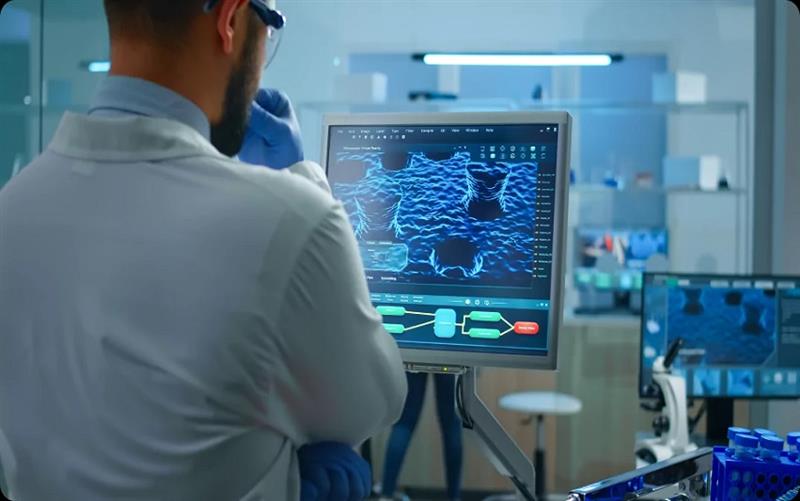
The future of healthcare lies in harnessing the power of advanced software solutions to drive innovation, improve patient care, and optimize operational efficiency. Embracing these technologies not only enhances clinical outcomes but also positions healthcare providers at the forefront of delivering personalized, accessible, and sustainable healthcare services.
The integration of advanced software solutions is poised to revolutionize the healthcare landscape by leveraging technology to improve patient care, operational efficiency, and overall health outcomes. From Electronic Health Records (EHR) and telemedicine to Artificial Intelligence (AI) and blockchain, each innovation plays a pivotal role in transforming
The future of healthcare lies in harnessing the power of advanced software solutions to drive innovation, improve patient care, and optimize operational efficiency. Embracing these technologies not only enhances clinical outcomes but also positions healthcare providers at the forefront of delivering personalized, accessible, and sustainable healthcare services.
1. Electronic Health Records (EHR) and Interoperability
Electronic Health Records (EHR) have replaced traditional paper-based records, offering a centralized digital repository of patient information. This transition has streamlined administrative tasks, improved data accuracy, and enhanced communication among healthcare providers. Key features include:
Comprehensive Patient Data: EHRs consolidate patient demographics, medical history, medications, allergies, lab results, and imaging reports into a single platform accessible to authorized personnel.
Interoperability: Interoperable EHR systems facilitate seamless data exchange between healthcare facilities and providers. This interoperability ensures continuity of care, reduces duplicate tests, and enhances care coordination across different healthcare settings.
2. Telemedicine and Remote Patient Monitoring
Telemedicine leverages technology to deliver healthcare remotely, providing patients with virtual access to medical consultations, diagnosis, and treatment. Remote Patient Monitoring (RPM) extends this capability by enabling continuous monitoring of patient health metrics from a distance. Key aspects include:
Virtual Consultations: Secure video conferencing platforms enable real-time interactions between patients and healthcare providers, overcoming geographical barriers and improving access to specialized care.
Remote Monitoring Devices: IoT-enabled devices such as wearables and home health monitors track vital signs, medication adherence, and disease progression. Data from these devices are transmitted to healthcare providers for timely intervention and personalized care management.
3. Artificial Intelligence (AI) and Machine Learning (ML)
AI and ML algorithms analyze large datasets to derive insights, predict outcomes, and automate decision-making processes in healthcare. These technologies offer several advantages:
Diagnostic Support: AI-powered imaging analysis improves diagnostic accuracy in radiology by detecting abnormalities and assisting in early disease detection.
Personalized Treatment: ML algorithms analyze patient data to tailor treatment plans based on individual health profiles, genetic information, and responses to therapies, optimizing clinical outcomes and minimizing adverse effects.
4. Blockchain in Healthcare
Blockchain technology ensures secure, transparent, and tamper-proof storage and sharing of healthcare data across decentralized networks. Key applications include:
Data Security: Blockchain's cryptographic protocols safeguard patient records from unauthorized access and cyber threats, maintaining data integrity and enhancing patient privacy.
Supply Chain Management: Smart contracts automate and validate transactions within healthcare supply chains, ensuring transparency in pharmaceutical distribution, medical device tracking, and inventory management.
5. Healthcare Analytics and Population Health Management
Healthcare Analytics utilize big data analytics to improve operational efficiencies and clinical outcomes by:
Predictive Analytics: Identifying at-risk populations and predicting disease trends based on demographic, socio-economic, and environmental factors.
Outcome Improvement: Population health management tools enable proactive interventions, preventive care strategies, and resource allocation to enhance population health outcomes and reduce healthcare costs.
6. Augmented Reality (AR) and Virtual Reality (VR)
AR and VR technologies enhance medical education, surgical training, and patient care experiences:
Training and Education: AR and VR simulations provide immersive learning environments for medical students, allowing them to practice complex procedures in a risk-free setting.
Therapeutic Applications: VR therapies alleviate pain, anxiety, and aid in rehabilitation by creating virtual environments that promote relaxation, distraction, and sensory stimulation.
7. Cybersecurity and Data Protection
As healthcare systems digitize, robust cybersecurity measures are essential to protect sensitive patient information:
Encryption and Authentication: Implementing encryption protocols, multi-factor authentication, and access controls to safeguard electronic health records (EHRs) and prevent unauthorized data breaches.
Regulatory Compliance: Adhering to regulations such as HIPAA (Health Insurance Portability and Accountability Act) ensures patient confidentiality and legal compliance in handling protected health information (PHI).
8. Personalized Medicine and Genomics
Personalized Medicine integrates genomic data with AI-driven analytics to customize healthcare treatments:
Genetic Profiling: Genetic testing identifies individual genetic variations predisposing patients to certain diseases or influencing their response to medications.
Precision Therapy: Pharmacogenomics uses genetic information to personalize drug therapies, optimize treatment effectiveness, and minimize adverse reactions based on genetic predispositions.